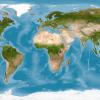
This project aims to assess and benchmark current and future challenges around water security in the Europe and Central Asia (ECA) region; and, to develop an operational Methodological Framework to conduct country and regional Water Security Assessments and Benchmarking as well as to provide country specific recommendations using an Action Planning Tool.
IIASA leads the research consortium, comprised also of HYDROPHIL GmbH (HYDROPHIL), and InterSus – Sustainability Services (InterSus), which has been selected by the World Bank to undertake this project.
The World Bank ECA Regional Water Security Initiative aims to promote the World Bank’s vision of “a water-secure world for all” by extending the Bank’s approach to water security across the ECA region, providing a systematic approach to examine water security within a broader context of national (or regional) macroeconomic trends and development objectives, such as the SDGs. Bringing this Initiative to implementation requires addressing several gaps. One is that while the concept of water security is widely used, and several definitions have been proposed, the concept is complex and multisectoral and there is no simple approach to quantifying and integrating all the dimensions of water security.
In an attempt to establish a robust methodology for measuring water security, the Water Global Practice of the World Bank has developed a “Water Security Diagnostic Framework”. This framework is intended to establish a consistent and structured approach to diagnosing water security, without being overly prescriptive. The approach recognizes that not all water-related challenges are equally significant in their impacts on people, ecosystems, and economies, but that a consistent approach is important to identify the most serious risks and greatest unexploited opportunities, to facilitate global comparisons and Benchmarking between countries. Until now, this Framework has been applied in several countries within and beyond the ECA region, and with mixed approaches and results. Against this background, the current project aims to develop a robust and consistent Methodological Framework, building on best practices from previous assessment and new proposals that can help to operationalize the “Water Security Diagnostic Framework” in the ECA region.
Expected results:
- An operational methodological framework for water security assessment, benchmarking, and an action-planning tool
- Elaboration of ten general water security assessment country reports.
- Target countries: Armenia, Azerbaijan, Belarus, Georgia, Kazakhstan, Kyrgyzstan Republic, Russia Federation, Tajikistan, Turkmenistan, and Uzbekistan
- Elaboration of six deep-dive water security assessment country reports.
- Target countries: Albania, Bosnia and Herzegovina, Croatia, Montenegro, Serbia, and Ukraine
- Elaboration of two Regional Water Security Assessment Reports: Danube basin and the ECA region
- Data package ready for integration into online data services and end-user dashboards
RESEARCH PARTNERS
HYDROPHIL is a global consulting and engineering company specialized in the water and environmental sectors. HYDROPHIL works all over the world and has special experience with projects and development processes in countries with developing and transition economies. The company provides services in the fields of water resources management, natural hazards (e.g., floods), irrigation and agriculture, climate change adaptation, water supply and wastewater infrastructure as well as institutional development. HYDROPHIL is uniquely positioned to contribute to water sector analysis and institutional dimensions of anchoring water security solutions.
InterSus is an environmental policy consultancy specialized in environmental economics with a focus on water management and economics, impact assessment of policies, cost-benefit assessments, water accounts, ecosystem services approach, the science-policy interface and capacity building/training. It has supported the development and implementation of European policies on several different topics with a focus on water-related Directives and has worked extensively on water economics in the Mediterranean region, the Balkans, Africa and Central Asia.

